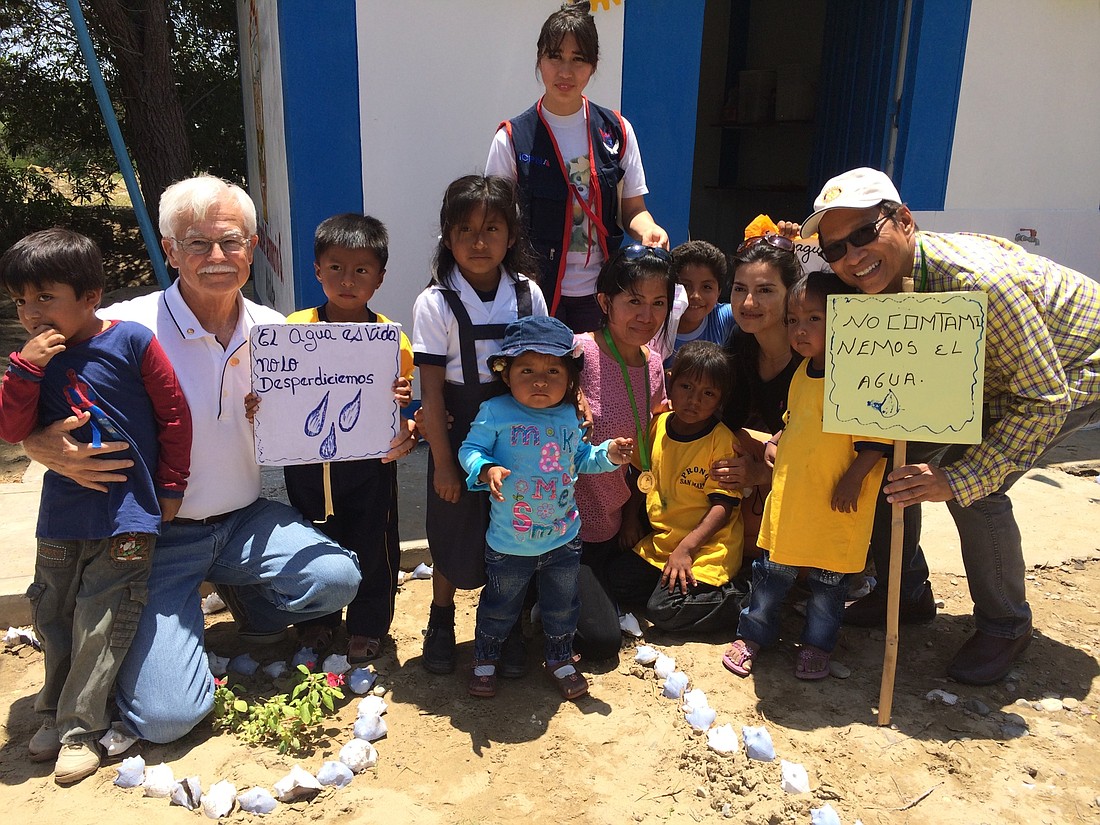- May 4, 2024
-
-
Loading

Loading

Ron Myers is a Waterlefe resident and a 25-year member of the Rotary Club of Lakewood Ranch. He is a past president of the club, and now serves as the chairman for the club’s annual fundraiser, the Suncoast Food and Wine Festival, and of the Clean Water Committee. The club will hold a celebration Thursday, Oct. 15, to recognize Rotary efforts in safe water and sanitation projects throughout the world, including several new projects in Peru.
We currently have a clean water initiative in Peru. We started that in 2011. We identified a project in a community in Peru through the host Peruvian Rotary Club. We work with that club to assess the community and get a budget for the project to determine what work is needed, whether that’s drilling wells, installing water systems or treating water. Part of the budget is educating people. Some of them don’t understand the fundamental health and sanitation issues. So we teach them about health and hygiene.
The local club works with an NGO (non-governmental organization) called Water Missions International, to facilitate the education. It’s made up of Peruvian engineers, and they do the assessments and work with the local Rotary Club. The local club’s job is to be sure that project is successful, not only in the beginning but two or three years later.
It takes three years to before you have what is called a sustainable project. The community needs to want to have safe water. They have to be able to put in some sweat equity, and they have to be willing to pay for the water, whether on a monthly basis or per container. They must set up a safe water committee, and the committee has a structure with a bank account, they hire an operator to work the equipment and they do training with households to train people in health and hygiene. All our systems use chlorine, which is why they’re safe, not clean. Without chlorine, the water can become contaminated if it’s put in a container that has bacteria. It’s really teaching the community how to operate a utility. What they learn after a while is that since they’re paying for the water and saving the money they don’t need, they eventually can accumulate some extra money to do something with.
Our club, knowing what the budget is, we try to raise the money. We raise it through private donors, other Rotary Clubs, our fundraiser, and then it’s matched by the Rotary Foundation. George Lewis, a member of our club, sells or raffles oil paintings to help raise money for projects. Some of his paintings have earned as much as $5,000 in a raffle.
Since 2011, we’ve organized 13 projects in Peru that do water and sanitation. Some of them do just water, some do both. Those 13 projects will serve about 19,000 people when they finish. The NGO and local Rotary Club have to follow up with projects after they finish for at least a year.
We try to take some people from our club and go down to Peru every couple of years to visit the communities, to talk to the NGO and Rotary Club to see how things are going and see what could be improved. We’re working on five more projects. One of those five is a project that our district, 6960, which is made up of 51 clubs from Manatee County to Marco Island, will contribute to. It will serve 360 needy families in Darwin Grandez, near Iquitos. It will be safe water and sanitation.
I like Peru. I went for the first time in 2012, and again in September 2014. I’ll probably go again next year. Lima is a modern city, the people were very friendly. The food is good. Ceviche is my favorite. Gourmet chefs have all natural, all organic ingredients, and they can be very creative in their foods. They’re some of the best in the world. When we went, every one wanted to go to Machu Picchu, but I didn’t, I’d rather visit people. What I learned was, we help out Rotary Club in Peru. They don’t have the money to do it, and they’re really grateful to us. When we go, the club is very welcoming. They’ll do lunches, host us everywhere and treat us very nicely. At the end of the day, it’s a project of the community.
I’m an engineer and I’m interested in humanitarian efforts. Rotary is a great organization. I was attracted to the water and sanitation area of focus in 2007 because of the need — there was a statistic that 5,000 children died every day from waterborne diseases. Now they estimate it’s around 2,000, but it’s still a lot of children. There’s been significant advancement, and it isn’t just Rotary, many organizations are working on the water crisis. We’re making progress. Just like polio was eradicated, the day will come when we get this issue under control.